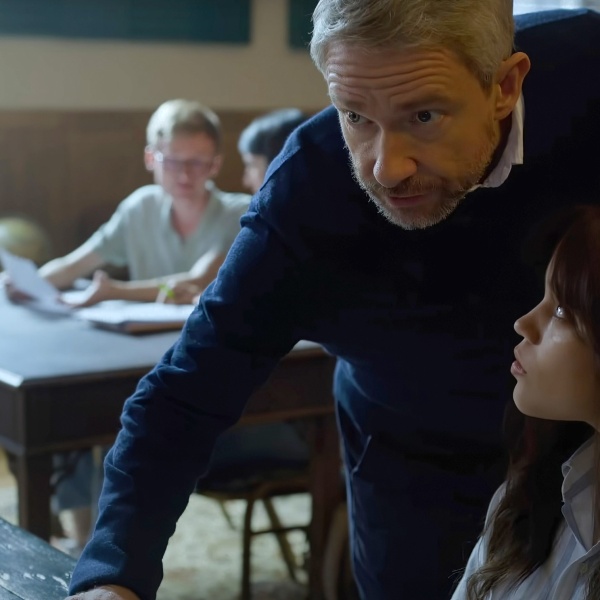Says He Still Hasn’t Seen ‘Black Water Transit’ & Is Prepping A Period Film Next

Matthew Chapman made waves this year at Sundance, with the premiere of “The Ledge,” his first time in the director’s chair since 1988’s “Heart of Midnight.” “The Ledge” is a thriller that follows a dangerous affair between the atheist Gavin (Charlie Hunnam) and Shana (Liv Tyler), the wife of the fundamentalist Christian Joe (Patrick Wilson). When Joe learns of the affair, he goes to great lengths to punish Gavin and his wife, believing that he’s well within the bounds of justice set down by the Bible.
During his twenty-odd year hiatus, Chapman worked on several screenplays, including 1992’s “Consenting Adults” and 2001’s “What’s the Worst That Could Happen?” He’s also had two books published, 2002’s “Trials of the Monkey: An Accidental Memoir,” which saw Chapman explore his heritage as Charles Darwin’s great-great-grandson, and 2007’s “40 Days and 40 Nights: Darwin, Intelligent Design, God, OxyContin, and Other Oddities on Trial in Pennsylvania,” that followed the much-publicized Kitzmiller v. Dover Area School District trial of 2005, an effort to require schools to teach Intelligent Design alongside evolution.
We had a chance to sit down with the writer/director to talk about the inspiration for “The Ledge,” using a thriller format to explore societal issues and just what is going on with Tony Kaye‘s still unreleased “Black Water Transit,” which Chapman wrote.

1. The movie was inspired by his two books.
Chapman clearly acknowledges the foundation set down by his journalistic work. “Trials of the Monkey: An Accidental Memoir” was originally conceived as a travelogue, with Chapman on his way to Tennessee to witness a reenactment of the Scopes Monkey Trial, a landmark 1925 case that saw a teacher brought up on charges of teaching evolution. What Chapman would eventually write would be an unexpected memoir that delved into his atheistic beliefs. “40 Days and 40 Nights” was more straightforward non-fiction work, focusing on a very recent cases with shades of the Scopes trial. Chapman’s travels have allowed him to meet a variety of people – among them resolute fundamentalists. “[In] Dayton, Tennessee, where my first book was set, and in rural Pennsylvania where I was covering the trial, I met people whose religious beliefs were, specifically in terms of the court case, just completely insane,” he said, adding “it was kind of fascinating to watch these people who, it didn’t matter what evidence you gave them, their conflict is what they wanted to believe, and they just went on believing it. And although the results were different, it was kind of like looking at Islamic fundamentalism. You felt that these people would go the distance for these insane ideas, because there was no logical defense, so there could only be one, I believe if you’re proposing something insane, the only way you can defend it is through insanity. So yeah, I met with a lot of people like Joe, the fundamentalist.”
2. Patrick Wilson is seen as a caricature on the coasts, but realistic in the flyover states.
Since “The Ledge” opened at Sundance, several reviews leveled a criticism against Wilson’s Joe, feeling that the character was a thinly sketched caricature. Chapman thinks this may be due to a disconnect between how religion plays on the coastal states versus the heartland. “This is one of the weird things that I’ve found with my film is that I’ve been criticized…on the coasts, Los Angeles, San Francisco, New York, New Haven, Boston, because you’re written a character that they think is a caricature. But then when the movie gets seen by people who live in Texas, or Oklahoma, or Tennessee, or rural Pennsylvania, they don’t see the caricature at all, they know these people,” Chapman said. “You realize when you talk to various people, more and more people have incredible stories about an out-there kind of person. I’ve met a lot of these guys, so I know that they exist and how terrifying they are,” he added with a laugh.
3. Chapman is a fan of using genre confines to explore deeper issues.
“The Ledge” features some very conventional thriller elements, and Chapman is well aware of it — in fact, he sees it as a vested strength. While “The Ledge” tackles weighty issues, it was his intention to deliver it under the guise of a thriller. “That’s the great thing about a thriller, and also comedy – if you need people sitting on the edge of their seat, or laughing their asses off, then they will take a little substance in the middle of it all…I’ve written a number of thrillers and I thought, wouldn’t it be great to use this artistic technique, to get an audience asking themselves, ‘I wonder what’s going to happen next?’,” Chapman said. There’s also an opportunity to enter into a more in-depth discussion with the audience. “If they’re sufficiently curious, then you can lead them down some sort of darker, deeper pathway and then bring them back up, at the end, into a flat-out thriller – is he going to jump or isn’t he, will the cops arrive in time to save the girl — all of these classic thriller conventions. I took some risks in having fairly long dialogue sequences, but I think it kind of paid off. I’ve seen, probably, nine or ten serious screenings, and I’ve only seen one person leave during the film. People leave to go to the bathroom but they come running back in again. It does seem to engage people.”
4. Chapman’s own experiences helped inform Patrick Wilson’s character and the allure of fundamentalism.
Asked how he attempted to humanize Joe even though he disagreed with the character’s beliefs, Chapman revealed he drew on his own history to get in the mindset of a fundamentalist. “Well, I’ve led a fairly hard life at times, and I’ve had a lot of people close to me die for various reasons, and being through depression, and drank too much…So if you’ve been through that sort of thing, you’ve thought about how you can struggle back to functionality,” he said. “You can see in these people that to them, they only want to be, the main option, apparently the only option, is the church. And if you’ve been kicked down into the gutter, you’ve become an alcoholic, you’ve done terrible things to people, you’ve been in horrible situations, you go into the church and you kind of get cleansed, and you can get a sense of community, you get people who say they love you, you get a God who says he’s going to take care of you. So I totally understand that character, and I sympathize instead of patronizing, I understand it. It’s not what I would do, and I think it leads people to do insane things and cruel things, but I understand the motivation behind it.”
5. Chapman is planning another faith based film that he hopes to make next spring.
“I do, I have a love story, which is two teenagers in Florence in the 15th century, when the city was the cradle of the Renaissance and the cradle of a kind of religious insanity,” Chapman said. “There was a Dominican friar there who was burning, books, paintings, and art in general. It’s a teenage love story set against two opposing forces – art and religion. I’m in the process of casting it now. I don’t think I can start shooting until March of next year, which means I’d finish it in the fall of 2012. It’d be probably come out in the summer of 2013.”
6. Chapman hasn’t seen “Black Water Transit” and has no idea what’s going on with the film currently.
Aside from David O. Russell‘s “Nailed,” one film we’ve had our eye on for some time is Tony Kaye’s troubled “Black Water Transit.” Both films were set up at the now-infamous Capitol Pictures, one of several now-bankrupt companies under shady producer David Bergstein. Mid-2010 saw Bergstein buy ‘Transit’ from himself in a less-than-reputable deal. The Kaye-directed film, which boasts a cast featuring Laurence Fishburne, Karl Urban and Brittany Snow, has been in limbo since. At Tribeca this year, Kaye said, “The movie is not finished yet. And me and David O. Russell and a few other filmmakers, we got caught in a hurricane. The poor company that financed it [Capitol Films], they had big ideas. And for us, the ideas were too big. Unfortunately, they just stretched themselves too thin. But they are gonna [finish it] at some point.”
However, Chapman’s outlook is a bit less optimistic. “It’s caught up in a kind of a bankruptcy situation. I myself am owed $300,000 by those people, and I’m sure Tony is owed a lot of money. It’s just a completely dysfunctional, horrible situation. I’m a big fan of Tony’s and I was very shocked by the unethical behavior.”
Asked if there was any suspicion on set of the financial troubles that would sink the backing for the film, Chapman responded frankly. “Yes, there was every suspicion. To get money out of these people…it’s kind of amazing how long you’ll wait [for financing] if you’re excited for the project, and how you’ll convince yourself that they’re telling the truth. ‘I promise you, we’re behaving like shit Matthew, we’re terribly sorry, the check will definitely be there by Friday, we’re really sorry, it’s a huge mistake.’ I mean, this went on for months…it was comic and then it was really bad news. They owe a lot of money. I have no idea how that will turn out. I’ve never seen the film myself.”
“The Ledge” opens in limited release this weekend and is also available on Video on Demand.



